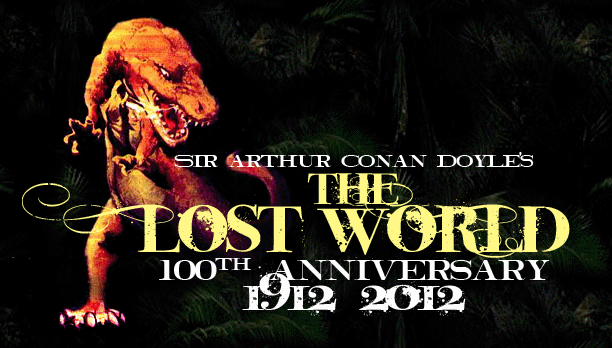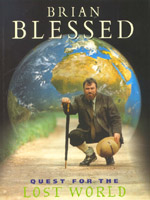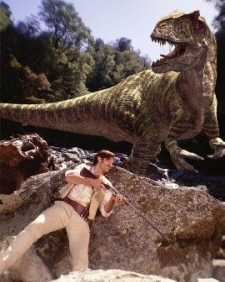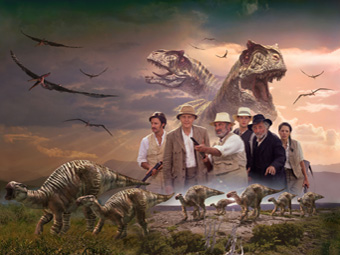

|
...That this mini-series isn't the BBC's first venture into The Lost World? BBC radio produced radio plays of the classic tale in 1938, 1944, 1949, 1952, 1958, and 1975! They also adapted The Poison Belt for radio in 1944 and 1949. BBC Spoken Word/Cover to Cover has released a new audio version read by Matthew Rhys, in conjunction with this programme.
Holding a lifelong love affair with The Lost World and almost the perfect genetic predisposition to play Professor Challenger, British actor Brian Blessed (Blackadder, Disney’s Tarzan) did originally audition for the lead role in the BBC production. For reasons unknown, Bob Hoskins was chosen over him, despite Hoskins rather tepid portrayal of the Neanderthal in a Lounge Suit. Upon seeing the finished product, Blessed reportedly doesn’t regret the lost opportunity. Meanwhile, you can read about Blessed’s affection for Conan Doyle’s tale and his own expedition to South America in Quest for the Lost World, published by Boxtree/Macmillan.


|
 Airing in the UK over Christmas Day and Boxing Day in 2002, and nicknamed "frocks with teeth" by the makers, BBC's production of The Lost World marked the first homegrown film adaptation of this classic of British literature. Bob Hoskins (Who Framed Roger Rabbit being his most famous mainstream work) plays the role of Professor Challenger, and the cast is rounded out by Peter Falk in the role of Rev. Theo Kerr, Tom Ward (Quills) as Lord Roxton, James Fox (Those Magnificent Men in Their Flying Machines) as Professor Leo Summerlee, Matthew Rhys (Titus) as cub reporter Edward Malone and Elaine Cassidy (Felicia's Journey) as Agnes Kerr. Director for the film was Stuart Orme, of Ivanhoe fame. Producing the £10 million series (about $20 million US) was Christopher Hall and Tim Haines, producers of the BBC's successful dinosaur documentary franchise started by Walking with Dinosaurs. The connection does not end there though: Framestore, the special effects company on those productions, also lent its skill to The Lost World. While the allosaurs are a little gruffer and more cinematically malevolent than their Walking with Dinosaurs counterparts, the dinosaurs have the benefit of being pulled from the same computer models as those for the generally scientifically accurate Walking With series. Whether or not they can compete with the dinosaurs of the 1925 version – which up to now have been the most accurate dinosaurs ever put to film based on what science knew at the time – is a matter for more open debate. At the very least, along with those of the 1925 version, these are living, breathing creatures from a bygone age rather than crude movie monsters. Filming for the epic took place in New Zealand, which has become a fantasy filming destination. As Hoskins noted, "It's the most amazing landscape I have ever seen and I've been around. I think New Zealand has a very bright future in films after Lord of the Rings and now this." Christopher Hall said "It's because of the West Coast that we are in New Zealand. We came looking for the place that would tell our story, we looked at Queensland and other places and the West Coast was where we found The Lost World." The production was also under strict supervision by the New Zealand Department of Conservation since it was being filmed in pristine and ecologically sensitive areas. The crew was rounded out by 75 production staff and an army of extras made up mostly by locals. However, a visiting Chilean soccer team was drafted into the filming of some scenes, for added authenticity. One bit of controversy that dogged the production was the requisite rewriting of the story to suit a television audience. In particular, it was the rewriting of Edwardian racial attitudes that troubled some, as it was seen as an attempt to rewrite history itself. Christopher Hall was quoted as saying "Some of the Victorian obsessions and concerns are now viewed slightly differently. There are things about Conan Doyle which are old-fashioned, particularly his view of natives. We feel differently now." He has said elsewhere that the changes were for the sake of time and adaptation, but did not say he was misquoted. However, despite legitimate concerns of cultural effacement and whether or not Conan Doyle’s own complex views towards race were being misrepresented, racism or the appearance thereof has always proven to be a problem for adaptations of The Lost World. Few are the productions that even try to tackle the matter at all: the 1925 film reduced the apemen to a single role, while every other version tends to avoid it. The Alien Voices audio-dramatization took perhaps the most mature approach by simply presenting the apeman war as it was and allowing mixed feelings of satisfaction, pragmatism, disgust and sympathy to come from the characters (even if they changed Prof. Summerlee to a woman). It doesn’t, however, say much to excise Edwardian attitudes about race while at the same time injecting an unhealthy dose of Information Age contempt for religious figures. In the interests of "political correctness", the half-breed who stranded the company on the plateau in the novel was replaced with a religious psychotic who embodies practically every negative stereotype of Christians in existence: Reverend Kerr is insane, Creationist, dogmatic and exclusionist... A solitary line in the novel about Challenger’s debate with a missionary over the effect of evolutionary theory upon faith was turned into a crude villain who all-but twirls a moustache. If religion is to be injected into The Lost World, one would at least hope that the approach would be mature and nuanced. Another complaint is the general lack of character in the characters. For the most part, they all seemed to be sleepwalking through it, and Bob Hoskins was far from a proper Challenger. Bad adaptations have sometimes still been at least somewhat salvageable by the cast. For example, the performances given by David Warner and John Rhys Davies in the 1992 version. James Fox plays yet another stuff Brit while trying to inject some warmth into Summerlee, to limited effect. Ward’s Roxton is at least an enjoyable scoundrel, though you know the arc of his character development – the most adjusted from the novel – within the first half hour. Elaine Cassidy follows in the footsteps of Bessie Love, but can’t even come close to filling her shoes. Despite the harshest criticisms, this BBC version still stands tall as the second best adaptation of the novel ever put to film. Of course, it’s not exactly hard to excel in a field in which there has only been one genuinely good version, produced way back in the silent era and towering over every version since. However, the BBC version benefits by at least being a proper adaptation. Even the 1925 version was a poor adaptation of the novel that managed to stand on its own qualities as an engaging story that was true to the feel of the novel if not the plot. This version actually manages to keep all the basic elements from the novel, and either changes them cosmetically or elaborates upon them. For example, the majority of the action takes place in that one gloriously ambiguous chapter towards the end of the book where the Challenger Expedition spends a great deal of time in the company of the victorious natives. It was naturally surprising to see the war with the apemen come so quickly, but the first hour of the series is a quite reasonable adaptation of the novel. The Iguanodon glade, the Pterosaur rookery, the stalking Allosaurs and Challenger’s egg-stealing cage were all present and accounted for. The only real problem this version has is not with the effects or even necessarily the basic plot, but rather, the tepid acting and the offensive stereotypes present in Falk’s character. Rumor and a final line about Atlantis in the closing minutes of the film suggested that Hoskins would return for further adventures as Challenger – perhaps inspired by Conan Doyle’s The Maracott Deep - but it never materialized. As part of any series or franchise, BBC’s The Lost World works most effectively as a continuation of the excellent Walking With Dinosaurs. Review by Cory Gross. Image courtesy of the BBC, on whose site it was formerly available as a desktop wallpaper.
|